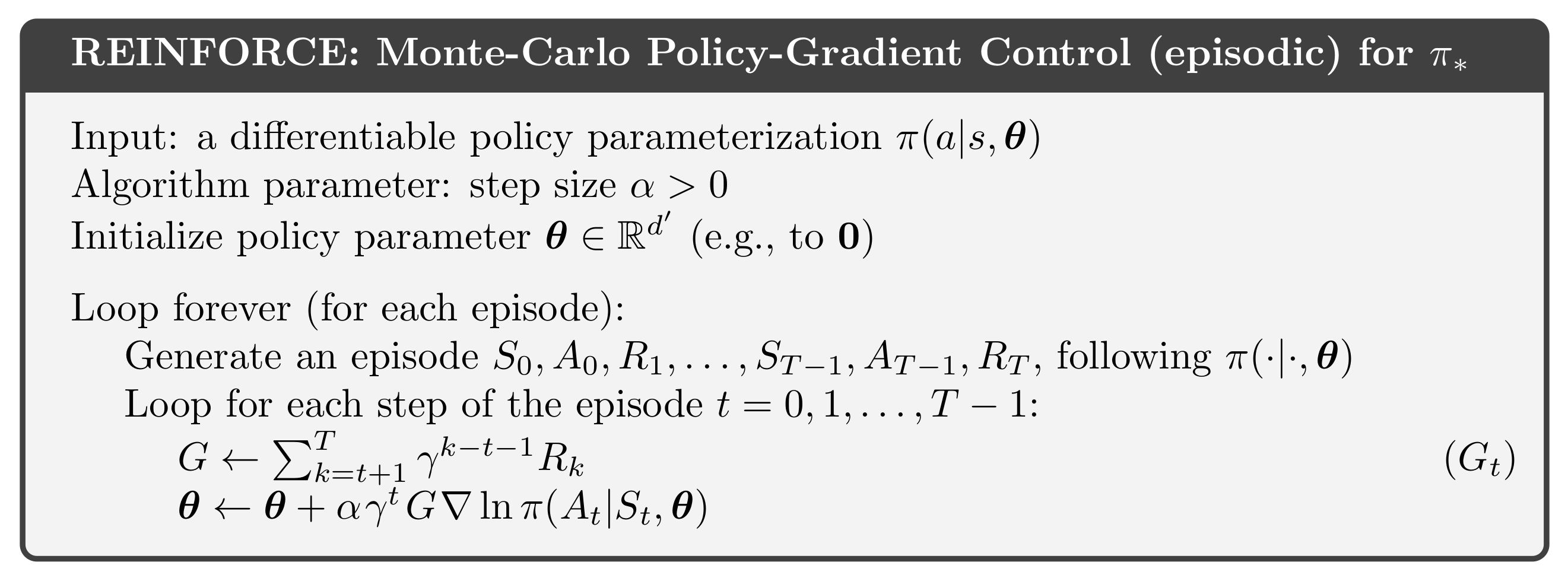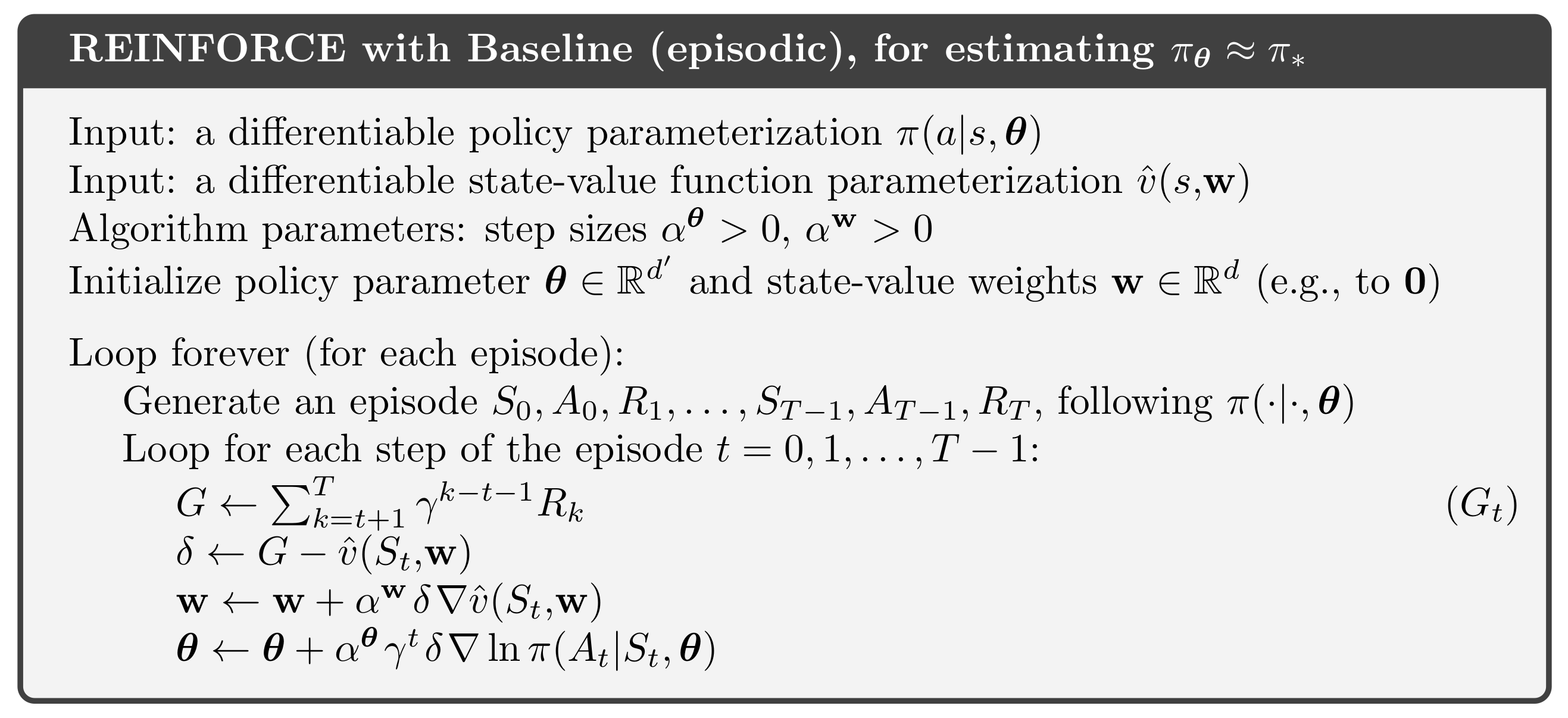Unbiased Estimates in Policy Gradient
Introduction
In reinforcement learning policy gradient methods, the goal is usually to maximize $\mathbb{E}[R_t]$, the expected value of return $R$ at time step $t$, where $R_t = \sum_{k=0}^{\infty} \gamma^k r_{t+k}$.
We have parameterized the policy $\pi(a|s; \theta)$ and update the parameter $\theta$ so that $\mathbb{E}[R_t]$ is maximized.
Standard REINFORCE algorithm updates policy in the direction $\nabla_{\theta} R_t \log \pi (a_t|s_t; \theta)$. That is to say, we have a loss function of $ -\log R_t \pi (a_t|s_t; \theta)$ and we are minimizing the loss.

But in order to mamixize $\mathbb{E}[R_t]$, why do we have to calculate the the derivatives for $R_t \log \pi (a_t|s_t; \theta)$? It turns out that it is because $\nabla_{\theta} R_t \log \pi (a_t|s_t; \theta)$ is an unbiased estimate of $\nabla_{\theta} \mathbb{E}[R_t]$, i.e., $\mathbb{E}[R_t \nabla_{\theta} \log \pi (a_t|s_t; \theta)] = \nabla_{\theta} \mathbb{E}[R_t]$.
Proof
We use the definition of expected value, because random variable $R_t$ is dependent on $a_t$ and it follows distribution $\pi (a_t|s_t; \theta)$.
$$
\nabla_{\theta} \mathbb{E}[R_t] = \nabla_{\theta} \int R_t \pi (a_t|s_t; \theta) d(a_t)
$$
Then we apply a special case of Leibniz Integral Rule, where
$$
\frac{d}{dx} \int_{a}^{b} f(x,t) dt = \int_{a}^{b} \frac{\partial}{\partial x} f(x,t) dt
$$
We then have
$$
\nabla_{\theta} \int R_t \pi (a_t|s_t; \theta) d(a_t) = \int \nabla_{\theta} [ R_t \pi (a_t|s_t; \theta) ] d(a_t)
$$
Because $R_t$ is dependent on $a_t$ but not dependent on $\theta$ (Is it?). We have
$$
\int \nabla_{\theta} [ R_t \pi (a_t|s_t; \theta) ] d(a_t) = \int R_t \nabla_{\theta} \pi (a_t|s_t; \theta) d(a_t)
$$
We apply an identity trick here
$$
\begin{aligned}
\int R_t \nabla_{\theta} \pi (a_t|s_t; \theta) d(a_t)
&= \int R_t \pi (a_t|s_t; \theta) \frac{\nabla_{\theta} \pi (a_t|s_t; \theta)}{\pi (a_t|s_t; \theta)} d(a_t) \\
&= \int R_t \pi (a_t|s_t; \theta) \nabla_{\theta} \log \pi (a_t|s_t; \theta) d(a_t)
\end{aligned}
$$
Because the random variable $R_t \nabla_{\theta} \log \pi (a_t|s_t; \theta)$ also follows distribution $\pi (a_t|s_t; \theta)$, we have
$$
\int R_t \pi (a_t|s_t; \theta) \nabla_{\theta} \log \pi (a_t|s_t; \theta) d(a_t) = \mathbb{E}[R_t \nabla_{\theta} \log \pi (a_t|s_t; \theta)]
$$
Therefore,
$$
\nabla_{\theta} \mathbb{E}[R_t] = \mathbb{E}[R_t \nabla_{\theta} \log \pi (a_t|s_t; \theta)]
$$
This concludes the proof.
Generalization
More generally it is not hard to see that,
$$
\nabla_{\theta} \mathbb{E}[f(z)] = \mathbb{E}[f(z) \nabla_{\theta} \log p (z; \theta)]
$$
Extension
We also use REINFORCE with baseline to reduce the variance of the estimate of $\nabla_{\theta} \mathbb{E}[R_t]$ while keeping the estimate unbiased.

In stead of using $\nabla_{\theta} R_t \log \pi (a_t|s_t; \theta)$ as an unbiased estimate of $\nabla_{\theta} \mathbb{E}[R_t]$, we use $\nabla_{\theta} (R_t - v(s_t)) \log \pi (a_t|s_t; \theta)$ as long as $v(s_t)$ does not dependent on $a$.
To see why $\mathbb{E}[(R_t - v(s_t)) \nabla_{\theta} \log \pi (a_t|s_t; \theta)] = \nabla_{\theta} \mathbb{E}[R_t]$, we have
$$
\nabla_{\theta} \mathbb{E}[R_t] = \nabla_{\theta} \int R_t \pi (a_t|s_t; \theta) d(a_t) = \nabla_{\theta} \int R_t \pi (a_t|s_t; \theta) d(a_t) - \nabla_{\theta} \int v(s_t) \pi (a_t|s_t; \theta) d(a_t)
$$
Where $\nabla_{\theta} \int v(s_t) \pi (a_t|s_t; \theta) d(a_t) = 0$.
Because $v$ use different parameters other than $\theta$ and it is not dependent on $a$,
$$
\nabla_{\theta} \int v(s_t) \pi (a_t|s_t; \theta) d(a_t) = v(s_t) \nabla_{\theta} \int \pi (a_t|s_t; \theta) d(a_t) = v(s_t) \nabla_{\theta} 1 = v(s_t) \times 0 = 0
$$
Quick Proof to Leibniz Integral Rule
$$
\begin{aligned}
\frac{d}{dx} \int_{a}^{b} f(x,t) dt
&= \frac{d}{dx} \int_{a}^{b} \int_{\mathbf{x}} \frac{\partial f(x,t)}{\partial x} dx dt\\
&= \frac{d}{dx} \int_{\mathbf{x}} \int_{a}^{b} \frac{\partial f(x,t)}{\partial x} dt dx\\
&= \frac{d}{dx} \int_{\mathbf{x}} (\int_{a}^{b} \frac{\partial f(x,t)}{\partial x} dt) dx\\
&= \int_{a}^{b} \frac{\partial f(x,t)}{\partial x} dt\\
\end{aligned}
$$
Thanks to the guidance from my friend Guotu Li on this.
Final Remarks
There is a statement or an assumption we made during the proof, that is $R_t$ is not dependent on $\theta$. It is because in this case $R_t$ is a scala value instead of an output from the policy neural network.
Unbiased Estimates in Policy Gradient
https://leimao.github.io/blog/RL-Policy-Gradient-Unbiased-Estimate/